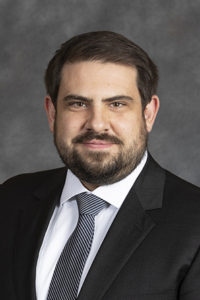Excise tax on commercial electric vehicle charging proposed
Nebraska would qualify for federal funding intended to establish a national electric vehicle charging network under a bill heard Feb. 22 by the Revenue Committee.

LB1218, sponsored by Lincoln Sen. Eliot Bostar, would impose an excise tax of 3 cents per kilowatt hour on the electricity used to charge electric and plug-in hybrid vehicles at a commercial electric vehicle charging station beginning in 2028.
State fuel tax revenue will decrease as more Nebraskans purchase vehicles powered by electricity rather than fossil fuels, Bostar said, resulting in less funding for road maintenance and construction. EV drivers currently contribute to road infrastructure funding only through a higher registration fee, he said.
“This change means that drivers of electric vehicles will contribute to infrastructure funding based on the amount of energy they consume, similar to drivers of traditional fuel vehicles,” Bostar said.
LB1218 would allow an electric supplier to own, maintain and operate a direct-current, fast-charging station for retail services only at a location that is at least 15 miles from a privately owned station and at least one mile from a federally designated alternative fuel corridor.
An electric supplier also would have to conduct a right of first refusal process before beginning construction of a fast-charging station.
Vicki Kramer, director of the state Department of Transportation, testified in support of the bill. She said it would allow private charging station operators in Nebraska to qualify for $30 million in federal funds under the National Electric Vehicle Infrastructure Program, which requires recipients to charge customers based on the amount of kilowatts per hour they consume.
Nebraska currently requires retailers to charge based on the amount of time a customer draws electricity from a charger, Kramer said.
“Most of the intended recipients of the NEVI funds in Nebraska, such as fuel centers, car dealerships [and] local governments … are unable to receive the funds under current law,” she said.
Randy Gard testified in support of LB1218 on behalf of the Nebraska Petroleum Marketers and Convenience Store Association and Bosselman Enterprises. He said the bill would ensure that retailers who choose to offer EV charging would not have to compete with electric utilities, which can pass on the cost of installing and operating fast-charging stations to their ratepayers.
“I believe these guardrails will ensure that Nebraska’s EV charging market develops with the same robust competition that has defined the traditional refueling markets for decades,” Gard said.
Testifying in opposition to LB1218 was Lincoln Electric System CEO Emeka Anyanwu. He said the proposed right of first refusal process would give an unfair economic advantage to private companies and interfere with the utility’s mission to provide ratepayers with “timely and equitable access” to EV charging.
“We have skilled staff, processes and procedures that make us more than well equipped to handle this kind of service to our customers,” Anyanwu said. “We reject the idea that the private sector can do it better than we can.”
Also in opposition was James Dukesherer, who testified on behalf of the Nebraska Rural Electric Association and the Nebraska Power Association. Giving retailers the right of first refusal to build a fast-charging station is unjustified, he said, because there have been no instances of an electric utility’s station undercutting one belonging to a private business.
“We are more than happy to sell these companies the electricity they will need to power these chargers,” Dukesherer said. “What we can’t do is support a statute that says public power is not allowed to sell electricity in Nebraska without first obtaining permission to do so.”
The committee took no immediate action on the bill.

